- Solar advice hub
- Cities-and-regions
- Solar panels in Wales: the ultimate guide
Solar panels in Wales: the ultimate guide
Thinking of going solar in Wales? Here's how much it costs, the best installers, any available grants, and whether it's actually worthwhile.


Why you can trust our content
We know that the solar industry is full of misinformation, but we only use reliable sources, including:
- Our experienced solar experts, installers and system designers
- Our own database of solar & battery system designs
- Authoritative bodies like MCS and the UK government



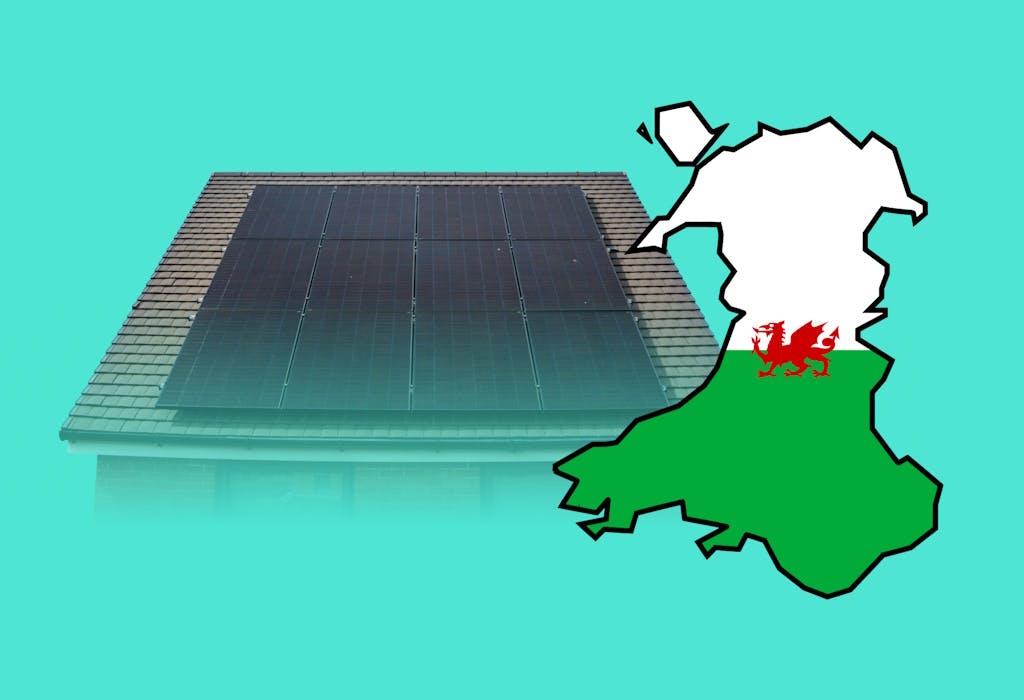
At a glance
If you’re fortunate enough to reside among Wales’ glorious mountains and gorgeous cities and you’re looking to cut your electricity bills, solar panels could be the best way forward.
From Pembrokeshire in the west to Chepstow in the east, Wales receives more sunlight than most areas of the UK, which gives residents with solar panels a significant advantage.
In this guide, we’ll explain how much solar panels cost in Wales, how the country’s sunny weather affects savings, and which grants can help you cut the upfront cost.
At Sunsave, we install across the whole of Wales – so if you’re wondering how much you could save with a solar & battery system, enter a few details below and we’ll generate a quick estimate.
What are the best solar panel installers in Wales?
| Name | Location | Founded | Customer score | Solar subscription? |
|---|---|---|---|---|
| Sunsave | Greater London | 2021 | 94% | Yes |
| LMG Home Improvements | Neath Port Talbot | 2016 | 98% | No |
| Inspire Green | South Glamorgan | 2022 | 94% | No |
| City Energy Network | South Glamorgan | 2011 | 86% | No |
| ECO 247 | Denbighshire | 2021 | 86% | No |
| Madola Energy | Gwent | 2013 | 80% | No |
We’ve used a stringent series of tests to assess more than 2,200 installers across the UK, and these installers above have performed the best of any in Wales.
They’re all certified by the Microgeneration Certification Scheme (MCS) or Flexi-Orb, accredited by the HIES, approved by TrustMark, registered with NAPIT, and have an excellent customer rating on at least one reputable review site.
The best of the best are also Which? Trusted Traders and provide a solar subscription option, though Sunsave is the only top-rated company that fulfilled the latter requirement.
We’ve also analysed customer review scores for these companies on sites including Trustpilot and Google, then turned these ratings into percentages to make them easier to compare.
To see the top companies across the country, check out our national guide to the best solar panel installers.
1. Sunsave
At Sunsave, our mission is to make solar accessible to all UK households, which is why we’re offering the country’s first solar subscription service.
Sunsave Plus enables you to start saving on your energy bills immediately, with no upfront cost.
You’ll get best-in-class kit installed on your roof, access to the best export tariffs, and the 20-year Sunsave Guarantee, which includes 24/7 monitoring & maintenance, a free replacement battery and inverter, and downtime cover – all for a fixed monthly fee.
Your system will also be insured by Aviva against damage, fire, and theft.
Our customers clearly appreciate our work, as they’ve left us more than 100 five-star ratings on Trustpilot, along with reviews praising our professional, responsive, helpful approach.
2. LMG Home Improvements
As you may guess from the name, this family-run company can deal with any measure you’d like installed in your household – and you can take full advantage.
Its solar arm, Big Green Solar, uses high-quality kit and has a near-perfect rating from its customers.
The Port Talbot-based installer has completed jobs all over south Wales, and excels at giving back to the local community. It recently sponsored local rugby club Waunarlwydd RFC during its 125th anniversary celebrations.
On its site, the company says: “We believe in the philosophy that a customer’s journey is just as important as the finished result. This is what we think makes us different.”
3. Inspire Green
Inspire Green has a sterling reputation in Cardiff, and for good reason.
The team has fitted solar panels on houses, offices, and at least one church – and according to its Trustpilot reviews, its installations are practically flawless.
Inspire Green is run by Simon, Damien, and Josh Powell, the latter of whom founded the company in 2022.
Speaking about why he took this step, Josh said: “I’ve been following the world of renewable and green energy for years, it’s just something that has always fascinated me.
“So when the opportunity arose for me to start a business here in Wales, focused on something I’m passionate about, I couldn’t turn it down.”
4. City Energy Network
This is no flash-in-the-pan company. City Energy Network has been up and running for more than a decade, and offers all types of home improvements, from insulation to EV charging.
The winner of Wales Fast Growth 50’s 2023 Good Business Award also puts an emphasis on helping customers access any government grants they may be eligible for, which could save you thousands of pounds.
It also speaks to the professional, helpful approach that’s earned City Energy Network hundreds of positive Trustpilot reviews. Customers speak about skilled solar installers who are polite, tidy, and quick.
5. ECO 247
Since being founded in 2021, this Denbighshire-based company has attracted a slew of positive Trustpilot reviews for its solar installations.
Customers have complimented the team’s personal, professional, cheerful attitudes, as well as their high-quality work.
Located just a stone’s throw from Prestatyn Beach on Wales’ northern coast, ECO 247 is also deeply knowledgeable about government grants, and keen to help people take advantage of them.
It’s not just lip service, either: multiple customers have left glowing Trustpilot reviews after ECO 247 helped them access government funding for their home improvements.
6. Madola Energy
Local boy Neil Parry founded Madola Energy in Tredegar in 2013, and has since turned it into a fully accredited and certified company that’s thriving in a competitive industry.
He told Sunsave: “We carry out 1,200 installations per year, on a good year. We do it all ourselves, which is probably what sets us apart.
“A lot of companies will use other firms to do their customer service, then when you have an issue, you don’t hear back from them. We set ourselves apart in that way, by getting back to people when they have problems and sorting it out.”
And it all came from one life-changing piece of advice. “When I was at university, my professor recommended I get into solar, because the Feed-in Tariff was being introduced – so that’s what I did!”
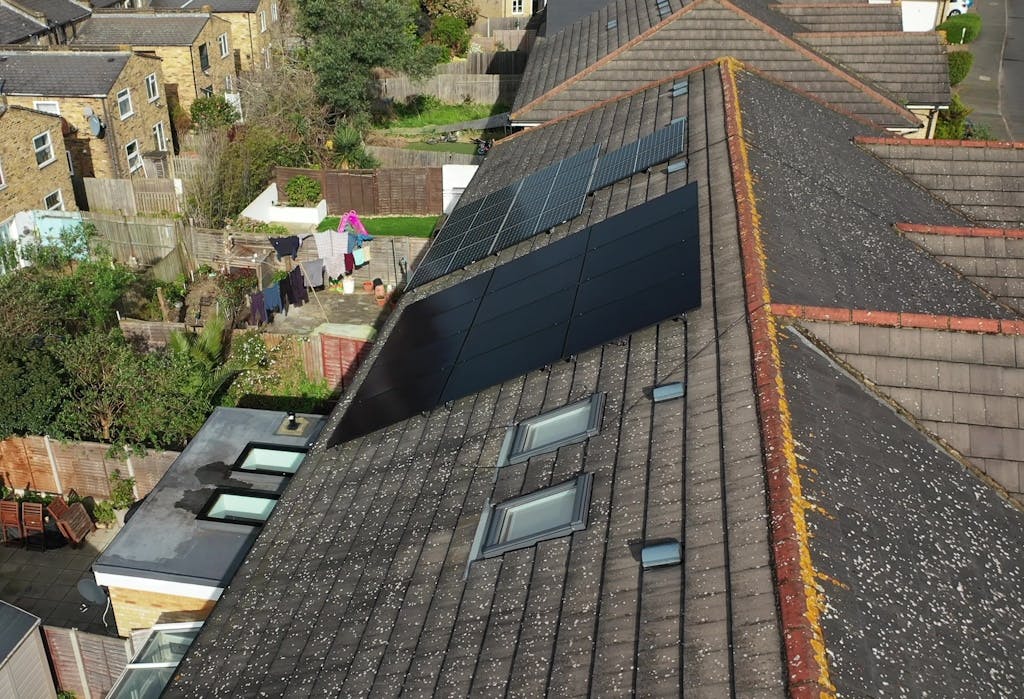
How much do solar panels cost in Wales?
| Property size | System size | Number of panels (430 W) | Estimated cost |
|---|---|---|---|
| 2-3 bedrooms | 3.01 kWp | 7 | £9,000 |
| 4-5 bedrooms | 5.16 kWp | 12 | £10,500 |
| 6+ bedrooms | 8.17 kWp | 19 | £13,500 |
A 3kWp solar panel system costs roughly £9,000 to buy and install in Wales.
To add a 5kWh battery to your system, you’ll generally pay another £2,000, for an estimated overall cost of £11,000.
Multiple factors could result in you paying a different amount for a solar panel system though, such as its size, the installation’s complexity, and which installer you pick.
To find out everything else you need to know, check out our guide to solar panel costs.
How many homes in Wales have solar panels?
93,035 homes in Wales have solar panels, according to the UK government’s latest update in June 2024.
This means that 6.8% of homes have gone solar, as there are just under 1.4 million households here.
That figure compares favourably with England, where 4.9% of households have solar panels, and Scotland, which has a 4.7% rate.
Are there any grants for solar panels in Wales?
There are grants for solar panels in Wales, thanks to local initiatives and national government schemes.
If you’re not eligible for any of these grants, but still can’t afford the price of solar panels, have a look at Sunsave Plus, which is available with no upfront cost.
For a fixed monthly payment over 20 years, you’ll receive best-in-class kit, full monitoring and maintenance support, and a system that can save you money from day one.
To check whether you could qualify for any of the following grants, click the button below and answer a few questions.
The Welsh Government’s Warm Homes Programme
From April 2024 to April 2031 at the earliest, the Warm Homes Programme will fully fund home improvements for energy-inefficient households, including insulation, heat pumps – and solar panels.
To qualify, you must own or privately rent your home and have an Energy Performance Certificate (EPC) rating of E or lower – or D, if someone in your household has a chronic circulatory, respiratory, or mental health condition.
You also have to either live in a low-income household or receive a qualifying means-tested benefit.
To start the process, just call 0808 808 2244 and answer some questions. The conversation usually lasts 30-40 minutes, and if your application is successful, British Gas will carry out your installation.
ECO4
ECO4 is the fourth phase of the UK government's Energy Company Obligation scheme, which is designed to lower fuel poverty and carbon emissions across Great Britain.
This £4 billion scheme compels all energy companies with over 150,000 customers to install products like solar panels in a certain number of disadvantaged, energy-inefficient households each year.
Tens of thousands of solar panel systems have been installed under ECO4, which is set to last until March 2026.
To get a free or heavily discounted solar installation, you must be a homeowner, private renter (with permission from your landlord), or a social housing tenant, and your home must primarily use an electric heating system.
You must also receive a qualifying benefit, though if you live in social housing that has an EPC rating of D or below, you may also be eligible.
If you're not claiming any of these benefits but live in a low-income household, or if you’re vulnerable to the effects of a cold home, you could still qualify through your council’s ECO4 Flex initiative.
To apply, fill in this Ofgem questionnaire to find out if you’re eligible. If you are, contact some ECO4 suppliers. You can go with any of the companies on this list, so it’s worth getting multiple quotes.
Home improvement loans
The Welsh government has provided councils across the country with £43 million so they can hand out interest-free loans for measures that will make homes in their area warm, safe, and secure.
As well as solar panels, this could include a new boiler, roof, kitchen, bathroom, or insulation, or resolving issues that are making your property energy-inefficient or unsafe, like damp or an overgrown garden.
You can usually borrow anywhere from £1,000 to £35,000, though you may have to pay a £500 administrative fee.
Every council has its own eligibility criteria, so get in touch with yours to see if you could qualify.
Is Wales sunny enough for solar?
Wales receives more sunlight than the majority of the UK.
Solar panels just need daylight to work, not direct sunlight, but they do produce more electricity under direct sunlight – which is why it’s fortunate that Wales is relatively sunny.
It varies across the country, though. Bangor in the north gets 1,114 kilowatt-hours per square metre (kWh/m²) per year on average, which is 2% above the UK average.
In the central part of Wales, Aberystwyth receives 1,124kWh/m², or 3% above the average – but if you drop down to the south, homes in Cardiff enjoy an impressive 1,220kWh/m², which is 12% higher than the UK average.
All these figures are based on the European Commission's Photovoltaic Geographical Information System, which provides regularly updated solar irradiance data.
The solar industry measures sunlight by tracking the sun’s average intensity in a particular area, which it calls ‘solar irradiance.’
It measures this in kilowatt-hours per square metre – that is, how much energy makes it from the sun, through 93 million miles of space, to a specific square metre on Earth.
There are many factors that affect solar panel output, but solar irradiance is one of the most crucial.
As you may expect, the more intense the sunlight that hits your panels, the higher the kWh/m², and the more solar electricity your system generates – which means higher savings for you.
How much power can a solar panel system generate in Wales?
A solar panel system in Wales can generate enough electricity to power the majority of your home’s electrical needs, allowing you to substantially lower your electricity bills.
We created the three designs below for households in north, central, and south Wales.
| Location | System size (kWp) | Battery size (kWh) | Average output per year (kWh) |
|---|---|---|---|
| Denbighshire | 4.3 | 5.8 | 3,072 |
| Gwynedd | 4.3 | 5.8 | 3,045 |
| Blaenau Gwent | 7.3 | 5.8 | 6,045 |
The Denbighshire and Gwynedd designs include 10 solar panels, while the Blaenau Gwent design has 17. All of these panels have a power rating of 430 watts (W), so together, they create 4.3 and 7.3 kilowatt-peak (kWp) systems.
Our designs all include a 5.8kWh battery, which allows each household to cover more than half of their household’s electricity needs.
These designs are all extremely productive and profitable. We estimate that the Denbighshire and Gwynedd households would reduce their electricity bills by 77% and 73% respectively.
The Blaenau Gwent home would cut its costs by a massive 128%, largely because it’d export 73% of its solar-generated electricity to the grid with Octopus Flux, one of the best export tariffs on the market right now.
Another of the main factors behind these homes’ ability to cut their costs is the lack of shade on their systems.
None of the roofs involved have more than 7% shading, on average, enabling their systems to use 93% of the available daylight.
Please note: you won’t necessarily produce as much solar electricity with your system, since these designs are for specific properties that may be different to yours – but it should give you a rough indication of what’s possible in Wales.
Is it worth getting solar panels in Wales?
It’s absolutely worth getting solar panels in Wales – and more so than most areas of the UK.
Wales benefits from high levels of solar irradiance, especially when compared to the UK average, which allows its residents to save hundreds of pounds per year by going solar.
There’s a reason why a hefty 6.8% of households in the country have chosen to get solar panels – and that percentage will likely rise over the coming years, as energy bills stay high and heat pumps and electric vehicles continue to rise in popularity.
If you’d like to buy solar panels but the upfront cost puts you off, check if you could qualify for schemes like the Warm Homes Programme, ECO4, or home improvement loans.
And if you don’t qualify for any of these government initiatives, you should consider Sunsave Plus, our all-in-one residential solar and battery solution that’s tailored to your home, and delivered as a monthly subscription with no upfront cost.
It comes with ongoing monitoring and maintenance, free replacement parts (including a battery and inverter), and downtime cover. Your system will also be insured by Aviva against damage, fire, and theft.
At Sunsave, we install across the whole of Wales – so if you’re wondering how much you could save with a solar & battery system, enter a few details below and we’ll generate a quick estimate.
Solar panels in Wales: FAQs
Related articles
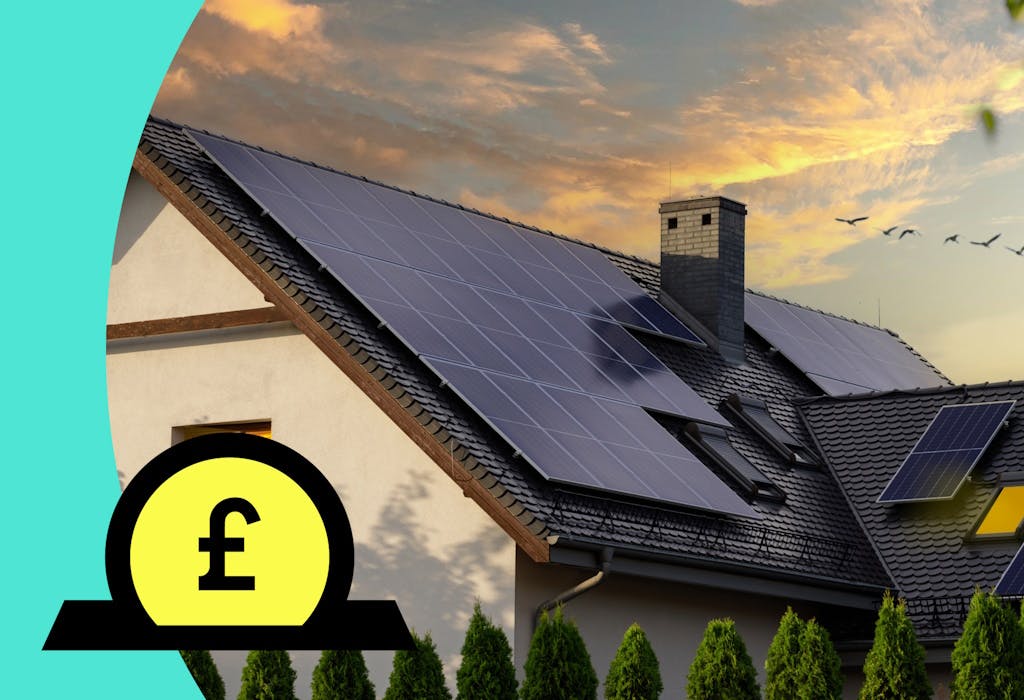
Are solar panels worth it in the UK?
Read full story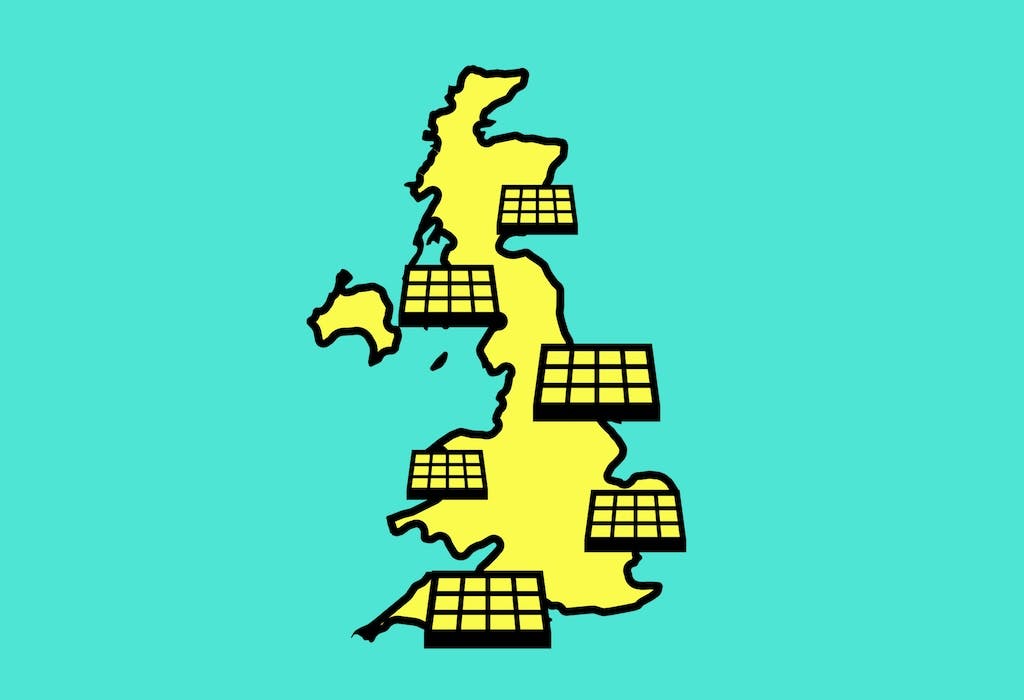
The 11 sunniest places in the UK
Read full story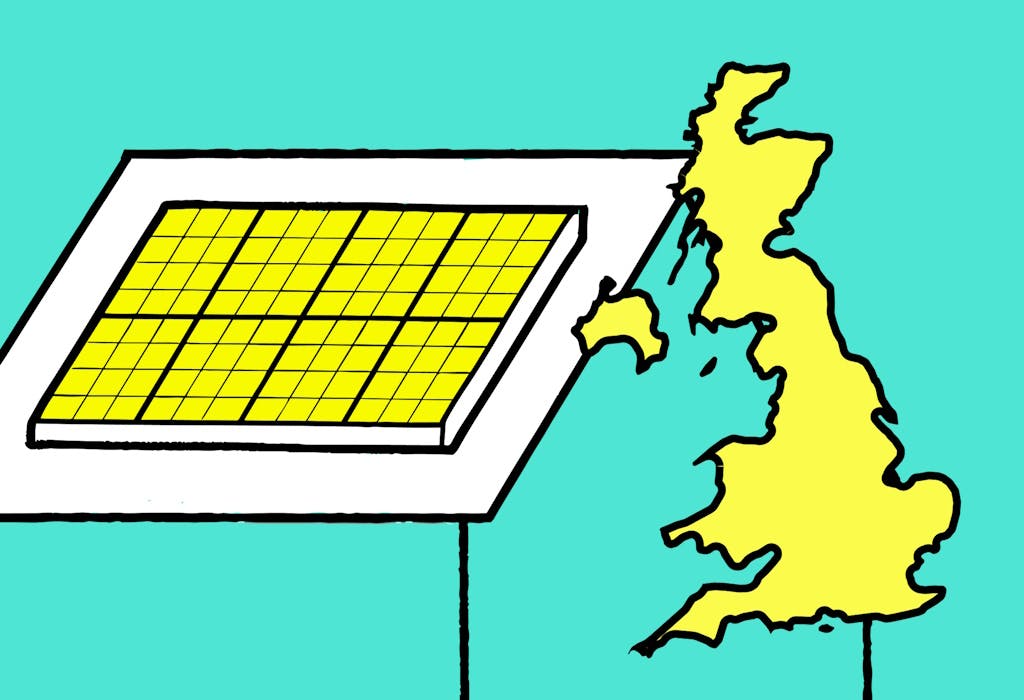
How many homes have solar panels in the UK?
Read full story
How many solar panels do I need?
Read full story
Written byJosh Jackman
Josh has written about the rapid rise of home solar for the past six years. His data-driven work has been featured in United Nations and World Health Organisation documents, as well as publications including The Eco Experts, Financial Times, The Independent, The Telegraph, The Times, and The Sun. Josh has also been interviewed as a renewables expert on BBC One’s Rip-Off Britain, ITV1’s Tonight show, and BBC Radio 4 and 5.